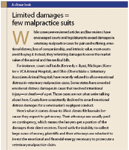I've been sued. Now what?
Your Medical Career and financial stability flash before your eyes. A gut-wrenching feeling takes hold. This is it; you've been hit with a malpractice lawsuit.
Your Medical Career and financial stability flash before your eyes. A gut-wrenching feeling takes hold. This is it; you've been hit with a malpractice lawsuit.

PHOTO BY MARK MCDONALD
Even if it's never happened to you, statistically speaking, you're worried it will. More than 77 percent of veterinarians are "concerned" or "very concerned" about being sued, according to the 2007 Veterinary Economics Business Issues Study. And rightly so. The idea that pets are more than just property is taking hold with animal lovers across the country. Animal law is being offered as a subject at more than 90 American Bar Association (ABA)-accredited law schools. And three years ago, the ABA began including an animal law committee in its tort trial and insurance practice section.
So yes, as a veterinarian, you're right to worry about a lawsuit. But you're probably worrying too much, especially about being sued for malpractice. First of all, pets are still lawfully identified as property in all 50 states. And even though animal law is now a recognized entity, veterinary malpractice lawsuits are still rare (see "Limited damages = few malpractice suits"). Take California, for instance, a litigious state that's home to more than 7,500 licensed veterinarians. Last year, only four veterinary malpractice lawsuits were filed in the state's superior court.

A closer look: Limited damages = few malpractice suits
Of course, these realities offer small consolation if and when you get sued. The following steps will prepare you to survive a malpractice suit so you can stop worrying and continue protecting yourself, your practice, and your patients.
Step 1: Stay calm.
A lawsuit always follows a predictable, step-by-step process. Instead of panicking, just focus your energy on completing the next step—and try to find comfort in the fact that this is a routine and well-traveled road lying ahead of you. Understanding the process limits surprises and frees you up to continue practicing your best medicine. For a start-to-finish explanation of what happens during a malpractice lawsuit, click here.
Step 2: Contact your professional liability carrier.
Ask that the carrier provide you with representation. A malpractice suit can range from a simple small claims action to a complex case tried before a jury in superior court. You'll need an attorney no matter which situation you face. (Some states do not allow your attorney to represent you at the trial in small claims court. However, I still recommend hiring an attorney to guide you through the process—and maybe even help you get the lawsuit dismissed.) If you don't have insurance, you must hire your own attorney to avoid a default judgment in favor of the plaintiff. And this is a good chance to remind you to get insurance before it's too late.
Step 3: Do your homework.
Review the pertinent medical record, but do not make any changes. Also write a timeline of the events leading up to the lawsuit. Do this right away so you don't forget details over time.
Step 4: Work with—not against—your attorney.
Attorneys need thorough information to successfully represent you. Provide all the documentation your attorney requests and immediately forward all written correspondence regarding the suit. Don't hold back when you're describing the events surrounding the lawsuit. It's tempting to omit details that you think aren't important, but you might not realize which facts will help your case. Sometimes people facing a lawsuit don't talk about certain details because they're afraid their attorney might think poorly of them. Bury this fear. Your attorney's opinion of you isn't important, but her knowledge of the situation is.
Step 5: Leave discussion of the case to the lawyers.
During the process of litigation, both sides will engage in discovery, which is a method of obtaining information. This does not mean that you should personally talk to the plaintiffs or their attorney. In fact, you should not communicate with them in any way—not in writing, not in person, and not on the telephone. Leave the discovery to the attorneys.

PHOTO BY MARK MCDONALD
If the media learns of the suit, reporters might contact you. Firmly decline their invitations to talk and direct them to your attorney. Mum's the word with other clients, too. If they ask you about the lawsuit, politely tell them you're not allowed to discuss it. You'll inevitably want to talk about the suit with your family members, and that's OK as long as you keep the discussions to a minimum. The less they know, the less likely they'll be forced to make judgment calls about who they can and can't talk to. It's also important to instruct all your team members to follow the same "no discussion" rules as you.
Step 6: Strive to settle.
Only about 10 percent of lawsuits ever go to trial; the other 90 percent are settled. It's normal to want your day in court, but settlement is usually preferable. First, rather than a jury deciding the outcome, you and the client—and your attorneys—are in control. Furthermore, a trial is emotionally and physically draining. If the case doesn't settle, the court will set a date for your trial. Once you receive a verdict, the losing party has the right to appeal to a higher court. This process could continue for years.

Associate perspective: I got sued-and survived
Remember that accepting a settlement is not an admission of guilt. When both parties agree to a settlement, the attorneys prepare an agreement that specifically states that you do not admit to any of the allegations in the plaintiff's complaint. Settling truly is a smart option, hence the low percentage of lawsuits that actually make it to trial.
A real-life example
I defended a veterinarian who was sued when a client's dog died after coming into the hospital for flea-related treatment. The client filed a lawsuit in superior court that included seven causes of action and demanded emotional distress and punitive damages. We went through extensive discovery and filed many motions. I filed a motion to strike the emotional distress, loss of companionship, and punitive damages, as well as a demurrer (click here for a definition of this term). The court granted part of the demurrer, eliminating two causes of action, and also granted the motion to strike the emotional distress and loss of companionship damages because these items were not supported by case law. The punitive damages remained in the case. The court set a trial date, then ordered us to hold a settlement conference with the trial judge. By the time we entered the settlement conference, the veterinarian and his employees had been forced to live through 15 months of motions, discovery, depositions, the threat of trial, and the possibility of paying punitive damages (which are not covered by insurance). We settled the case during this mandatory settlement conference with the trial judge. Finally, in one afternoon, with trial a mere two weeks away, the case was over. The parties signed settlement agreements, money was paid, and everyone moved on.
There is a light
It may sound virtually impossible, but you can recover—both professionally and personally—from a malpractice suit. My client in the above-mentioned case returned to work at his practice. He viewed the lawsuit as a learning experience and ended up changing his record-keeping system, personnel management tactics, and client communication strategies. And he no longer lives in fear of a lawsuit. He knows that if it happens again, he'll come out stronger and be a better veterinarian. And the same will be true for you.
The bottom line
Knowledge is power
You might feel like hiding in a corner, but getting sued doesn't mean your career is over. Understanding the legal process and the steps you need to take will help you face a lawsuit head-on.
Bonnie Lutz, Esq., is partner with Klinedinst Attorneys at Law in Santa Ana, Calif. Send your comments to ve@advanstar.com

Bonnie Lutz, Esq.